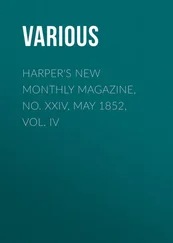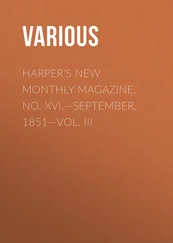Various - Harper's New Monthly Magazine, No. VII, December 1850, Vol. II
Здесь есть возможность читать онлайн «Various - Harper's New Monthly Magazine, No. VII, December 1850, Vol. II» — ознакомительный отрывок электронной книги совершенно бесплатно, а после прочтения отрывка купить полную версию. В некоторых случаях можно слушать аудио, скачать через торрент в формате fb2 и присутствует краткое содержание. Издательство: Иностранный паблик, Жанр: periodic, foreign_edu, на английском языке. Описание произведения, (предисловие) а так же отзывы посетителей доступны на портале библиотеки ЛибКат.
- Название:Harper's New Monthly Magazine, No. VII, December 1850, Vol. II
- Автор:
- Издательство:Иностранный паблик
- Жанр:
- Год:неизвестен
- ISBN:нет данных
- Рейтинг книги:4 / 5. Голосов: 1
-
Избранное:Добавить в избранное
- Отзывы:
-
Ваша оценка:
- 80
- 1
- 2
- 3
- 4
- 5
Harper's New Monthly Magazine, No. VII, December 1850, Vol. II: краткое содержание, описание и аннотация
Предлагаем к чтению аннотацию, описание, краткое содержание или предисловие (зависит от того, что написал сам автор книги «Harper's New Monthly Magazine, No. VII, December 1850, Vol. II»). Если вы не нашли необходимую информацию о книге — напишите в комментариях, мы постараемся отыскать её.
Harper's New Monthly Magazine, No. VII, December 1850, Vol. II — читать онлайн ознакомительный отрывок
Ниже представлен текст книги, разбитый по страницам. Система сохранения места последней прочитанной страницы, позволяет с удобством читать онлайн бесплатно книгу «Harper's New Monthly Magazine, No. VII, December 1850, Vol. II», без необходимости каждый раз заново искать на чём Вы остановились. Поставьте закладку, и сможете в любой момент перейти на страницу, на которой закончили чтение.
Интервал:
Закладка:
THE FUGITIVE KING AT BOSCOBEL; ADVENTURES OF THE MERRY MONARCH
Boscobel House, which has obtained so much historical celebrity, in connection with the romantic adventures of Charles II., after his defeat at Worcester, is situated in Shropshire, on the borders of Staffordshire, lying between Tong Castle and Brewood. It was built in the reign of James I., by John Giffard, Esq., a Roman Catholic gentleman, who, when it was completed, having invited his neighbors to a house-warming feast, requested his friend, Sir Basil Brook, to give his new-built mansion a name. Sir Basil called it "Boscobel," from the Italian word, boscobella , because it was seated in the midst of many fair woods. The founder of the house had caused various places of concealment to be constructed, for the purpose of affording shelter to proscribed persons of his own religion, whom the severity of the penal laws often compelled to play at hide and seek, in queer corners.
The first fugitive of note who sought refuge, in his distress, at Boscobel House, was the unfortunate Earl of Derby, whose defeat at Bolton-le-Moors, near Wigan, was the precursor to that of the young king at Worcester, eight days later. The Earl of Derby, having escaped from his lost battle, with Colonel Roscarrock and two servants, got into the confines of Shropshire and Staffordshire, where he had the good luck to encounter an old friend, Mr. Richard Snead, an honest gentleman of that country, to whom he told the news of his own overthrow, and inquired if he knew of any private house, near at hand, where he might repose himself and his company in safety, till he could find an opportunity of joining the king. Mr. Snead, like a good Samaritan, conducted his noble friend to Boscobel House, where they arrived on Friday, August 29th, but found no one at home, except William Penderel, the housekeeper, and his wife, who, on their own responsibility, ventured to receive the noble cavalier, his companion, and servants, and kindly entertained them till the Sunday; and then, according to the earl's desire, conveyed them safely to Gataker Park, nine miles on their way to Worcester, where he arrived in time to take his part in that engagement which was emphatically styled by Stapylton, the roundhead, "the setting of the young king's glory."
The Earl of Derby and Colonel Roscarrock were in close attendance on Charles's person during the retreat from Worcester. They all made a stand on Kinner Heath, on the road to Kidderminster, as the night set in, to hold a consultation, when his majesty, being very tired, inquired of them and Lord Wilmot, "If they thought there was any place where he might venture to take a few hours' rest?" The Earl of Derby told him, "how, in his flight from Wigan to Worcester, he had met with that rara avis , a perfectly honest man, and a great convenience of concealment at Boscobel House; which, nevertheless, he thought it his duty to inform his majesty, was the abode of a recusant." At another time, some of the party might have objected to the young sovereign going to such quarters, but the danger being so imminent, now it was suggested, "that these people being accustomed to persecutions and searches, were most likely to possess the most ingenious contrivances to conceal him." At all events, the king made up his mind to proceed thither. When this decision was made known to Lord Talbot, he called for a young kinsman of the recusant master of Boscobel, Mr. Charles Giffard, who was fortunately among the sixty cavaliers who still shared the fortunes of their fugitive king. Lord Talbot inquired of this gentleman, if he could conduct his majesty to Boscobel. Charles Giffard cheerfully undertook to do so, having with him a servant of the name of Yates, who understood the country perfectly.
At a house about a mile beyond Stourbridge, the king drank a little water, and ate a crust of bread, the house affording no better provision. After this scanty refection, his majesty rode on, discoursing apart with Colonel Roscarrock about Boscobel House, and the security which he and the Earl of Derby had enjoyed at that place. Another privy-council was held, in the course of the journey, between the king and his most trusty friends, at which it was agreed, that the secret of his destination was too important to be confided to more than a select few of his followers; and Charles Giffard was asked if it were not possible to conduct him, in the first instance, to some other house in the neighborhood, the better to mask his design of concealing himself at Boscobel. The young cavalier replied, "Yes, there was another seat of the Giffards, about half a mile from Boscobel – Whiteladies; so called from its having been formerly a monastery of Cistercian nuns, whose habit was white." On which the king, and about forty of the party, separating themselves from the others, proceeded thither, under his faithful guidance. They arrived at break of day; and Giffard, alighting from his horse, told the king "that he trusted they were now out of immediate danger of pursuit." George Penderel, who had the charge of the house, opened the doors, and admitted the king and his noble attendants; after which, the king's horse was brought into the hall, and they all entered into an earnest consultation how to escape the fury of their foes; but their greatest solicitude was for the preservation of the king, who was, for his part, both tired and hungry with his forced march. Col. Roscarrock immediately dispatched a boy, of the name of Bartholomew Martin, to Boscobel, for William Penderel: Mr. Charles Giffard sent for another of these trusty brethren, Richard Penderel, who lived at Hobbal Grange, hard by. Both speedily obeyed the summons, and were brought into the parlor, where they found their old acquaintance, the Earl of Derby, who introduced them into the inner parlor, which formed then the presence chamber of their throneless sovereign: the earl, reversing the order of courtly etiquette on this occasion, instead of presenting these two noble men, of low degree, to their royal master, he presented him to them; addressing himself in particular to William Penderel, and pointing at his majesty, he said, "This is the king; thou must have a care of him, and preserve him, as thou didst me."
William, in the sincerity of an honest heart, promised that he would do so, while Charles Giffard was at the same time exhorting Richard Penderel to have an especial care of his charge.
The loyal associates next endeavored to effect a transformation in the personal appearance of their royal master, by subjecting him to a process very similar to that technically styled by gipsies, "cutting a horse out of his feathers." In the first place, Richard Penderel trimmed off his majesty's flowing black ringlets in a very blunt and irreverent fashion, using his woodman's bill, which he happened to have in his girdle, instead of scissors, none being at hand, and time being too precious to stand on ceremony. His majesty was then advised to rub his hands on the back of the chimney, and with them to besmear his face, to darken his peculiar Italian-like complexion with a more swarthy tint. This done, he divested himself of his blue ribbon and jeweled badge of the Garter, and other princely decorations, his laced ruff and buff coat, and put on a noggen coarse shirt belonging to Edward Martin, a domestic living in the house, and Richard Penderel's green suit and leathern doublet, but had not time to be so exactly disguised as he was afterward, for both William and Richard Penderel warned the company to use dispatch, because there was a troop of rebels, commanded by Col. Ashenhurst, quartered at Cotsal, but three miles distant, some of which troop arrived within half an hour after the noble company was dispersed.
Richard Penderel conducted the king out through a back door, unknown to any of his followers, except a trusted few of the lords, who followed him into the back premises, and as far as an adjacent wood, belonging to the domain of Boscobel, called Spring Coppice, about half a mile from Whiteladies, where they took a sorrowful farewell of him, leaving him under the watchful care of three of the trusty Penderel brethren – William, Humphrey, and George. The Earl of Derby and the other gentlemen then returned to their comrades at Whiteladies, where, mounting in hot haste, with the intrepid Charles Giffard for their conductor, they scoured off on the north road; but a little beyond Newport they were surrounded by the rebels, and after some resistance, were made prisoners. Charles Giffard contrived to effect his escape from the inn at Banbury, where they halted, but the loyal Earl of Derby, who had sacrificed his own personal safety by resigning to his sovereign the little city of refuge at Boscobel, instead of occupying it himself, was subjected to the mockery of a pretended trial by the rebels, and beheaded, although he had only surrendered on a solemn promise of receiving quarter – promises which were never regarded by Cromwell and his associates. The cool-blooded malignity with which, in his dispatch, announcing his triumph at Worcester, Cromwell points out the noble captives, whom the fortunes of war had placed in his magnanimous hands, to his merciless tools as " objects of their justice ," what was it but signing their death-warrants by anticipation, before the mock trials took place of the fore-doomed victims? and how revolting, after that death-whoop, appears the Pharisaical cant of his concluding sentences:
Читать дальшеИнтервал:
Закладка:
Похожие книги на «Harper's New Monthly Magazine, No. VII, December 1850, Vol. II»
Представляем Вашему вниманию похожие книги на «Harper's New Monthly Magazine, No. VII, December 1850, Vol. II» списком для выбора. Мы отобрали схожую по названию и смыслу литературу в надежде предоставить читателям больше вариантов отыскать новые, интересные, ещё непрочитанные произведения.
Обсуждение, отзывы о книге «Harper's New Monthly Magazine, No. VII, December 1850, Vol. II» и просто собственные мнения читателей. Оставьте ваши комментарии, напишите, что Вы думаете о произведении, его смысле или главных героях. Укажите что конкретно понравилось, а что нет, и почему Вы так считаете.












